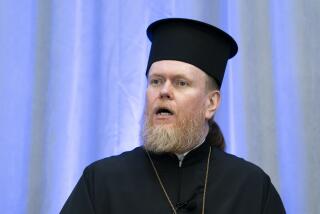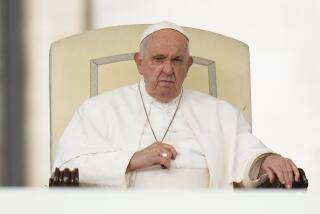Poland Mourns Loss of Its Son
- Share via
KRAKOW, Poland — They gathered by the thousands before the window at No. 3 Franciscan Street, where Archbishop Karol Wojtyla so often spoke to them before he became pope. But only a bronze crucifix draped in a red stole, a symbol of the Resurrection, appeared there Saturday.
In the midst of an evening vigil, they learned that their “good shepherd ... belongs already to God.” Silence descended and lingered on the cobblestoned streets.
The moment that so many Poles had dreaded and prayed would be postponed a little longer had finally arrived. Their friend, their father, their pastor had died in Rome. A few people choked back sobs; many in the throng dropped to their knees in sorrow and submission.
With grief and anguish, the news spread to the sites in Poland that were dear to Pope John Paul II, who was born here nearly 85 years ago.
Prayers were uttered in his hometown of Wadowice, nestled in the foothills of southern Poland; at the shrine to the Black Madonna of Czestochowa, one of his favorite pilgrimage sites; and in the once-grim and now brightening cities of Warsaw and Gdansk, where millions had gathered to hear him preach a liturgy of hope and solidarity in sermons that helped spur an end to communist rule across Eastern and Central Europe.
Millions the world over adored John Paul. But the pain of his death will be particularly acute in Poland, the country that bore him and shaped him, and that was in turn indelibly transformed by him and his papacy.
“In this hour of mercy, the pope has left us to go to the Lord,” announced Father Piotr Iwanek, leading the prayers in the plaza in Krakow, where Wojtyla secretly studied to become a priest during the Nazi occupation, and where he battled communist authorities later as a bishop, archbishop and cardinal.
“Already today, he is praying for us at the throne of the Lord,” said a statement issued by the Council of Polish Bishops.
The news leaped from cellphone to cellphone in short text messages: “Light a candle for the pope.... A great man of honor has left us,” one read.
On Polish television, which had been covering the decline of the pope round the clock since Friday morning, announcers wore black.
President Aleksander Kwasniewski addressed the nation, delivering a brief eulogy.
“A great pope has left us, our greatest compatriot and a good father,” said the onetime communist who now presides over a democracy of 38 million people that in a generation has gone from membership in the Soviet bloc to the European Union and alliance with the West.
“We Poles have a very special debt to him,” Kwasniewski said. “There would be no Polish freedom without the Polish pope. We thank you for everything, Holy Father.” To the haunting music of another great Pole, Frederic Chopin, the president then bowed and lighted a candle before a portrait of the pontiff.
In Wadowice, bells rang and people fell to their knees outside the church of St. Mary, where the pope was baptized, and later said Mass. The parish priest, Father Jakub Gil, said, “This wound will bleed for a long time.”
Earlier in the day, a high school friend of the pope, Eugeniusz Mroz, had been reminiscing from the house at 7 Church St. where the young Wojtyla was born and lived until his move to Krakow as a young man. Mroz told of how his strong, devoted and good friend, then known to his classmates as “Lolek,” loved acting and soccer.
They used to play in the street in front of the church, with Lolek’s older brother Edmund standing in for a goalpost, he said. The parish priest was afraid they would break the stained glass, Mroz recalled, choking back tears.
Robert Masiuk, 25, and his wife, Iwona, 24, were keeping vigil on the square in front of the pope’s childhood school, their 3-year-old daughter Wiktoria, clinging to her mother.
Masiuk said he was still in his mother’s womb during the pope’s first return to Poland as pontiff in 1979, a trip that many historians now see as the catalyst for the rise of Solidarity, the first free trade union in Soviet-controlled Eastern Europe and the crack in Soviet dominance.
Growing up, Masiuk said, he tried to attend each of the pope’s eight returns to his homeland.
“The older he became, the more authority he had for us young,” Masiuk said. “I wanted to be a better man, a better human being, after each visit.”
Far beyond Poland, the humble and great, old and young, men and women paused to commemorate a spiritual leader whom not all agreed with but whose impact was undeniable.
In Latin America, home to the world’s largest concentration of Roman Catholics, grief and reverence wove together for a man who visited the region many times.
Although the pope’s legacy in the region is mixed, because of his opposition to the liberal priests who sided with leftist rebels fighting repressive regimes during the Cold War, residents called the pontiff an inspiration.
“He was a different pope, a modern pope. He always preached peace and forgiveness,” Julia Carvalho, 55, said following afternoon Mass at the Church of the Resurrection in Rio de Janeiro, during which the priest announced the pope’s death. “This is something I will always remember.”
In Mexico City, newspapers bade the pope “Adios.” The Metropolitan Cathedral was jammed during a memorial service for the pontiff, whose portrait graced the altar.
As bells tolled, a man outside bore a sign that read, “John Paul, please take me with you.”
The pontiff was remembered with respect in parts of the Mideast as the first pope to visit a mosque, on a trip to Syria in 2001.
“We hope that the course of dialogue charted by the Holy See will lead to all religions converging on faith in God and on confronting the world arrogance that is treating people unjustly,” Grand Ayatollah Mohammed Hussein Fadlallah, the top Shiite Muslim cleric in Lebanon, told the Daily Star newspaper.
*
Times staff writers Henry Chu in Rio de Janeiro, Reed Johnson and Narayani Lasala in Mexico City, Megan K. Stack in Cairo and Ela Kasprzycka of The Times’ Warsaw Bureau contributed to this report.
More to Read
Sign up for Essential California
The most important California stories and recommendations in your inbox every morning.
You may occasionally receive promotional content from the Los Angeles Times.










